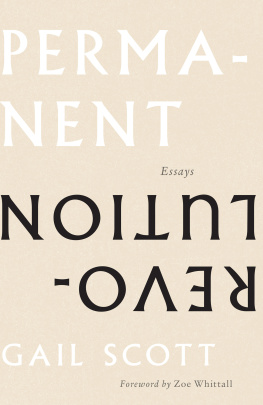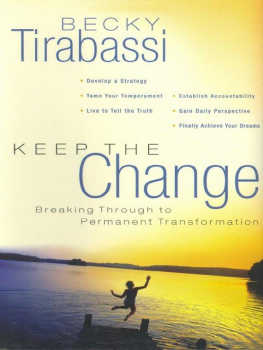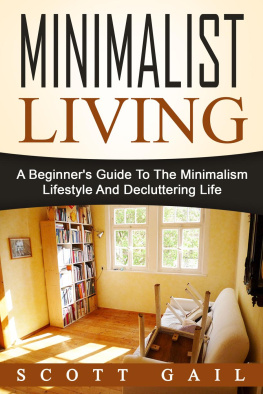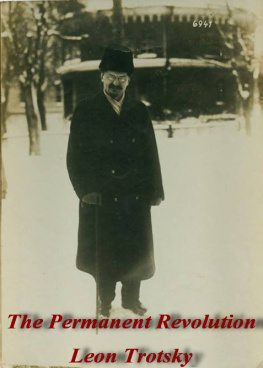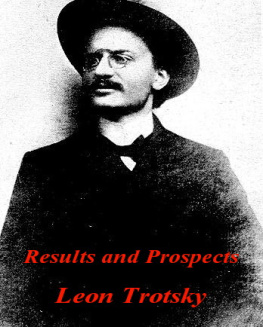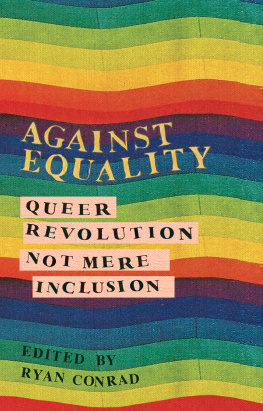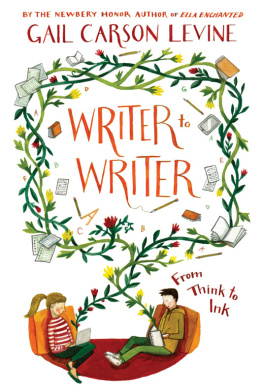
Praise for
Permanent Revolution
At once erudite and intimate, Permanent Revolution is a vital set of meditations on difficulty and feminist art. Gail Scott convincingly and beautifully evokes feminism as an ongoing experimental practice: courageous, expansive, and necessary to all.
Anne Boyer, author of The Undying, Winner of the Pulitzer Prize for Nonfiction
I can never write the novel I want. Gail Scott. In this context, is the sentence a crypt? When does nescience, in the way that word is used by Abraham and Torok, first become a possibility, an analog, a coin, for this other kind of prose, which is to say: not a novel (then)? Permanent Revolution is written in the gap between what a novel could have been and what is possible now, and thats a kind of grammar. Reading these essays, I felt the part of me that never writes, but longs to, come back to life for a few moments and/or forever. The gaps so great, its almost comical. Gail Scott, who once said that the space between sentences is an abyss. I wrote that down, and thought about it for years afterwards. There was something irreversible, I understood, about what might come next. What will you give up? Who will you never see again? That is: where + how in writing? Gail Scott.
Bhanu Kapil
I can still remember the thrill of first entering the space of Gail Scotts novel, My Paris, a diary written all in present participles, the way I stumbled along the sentences as if around a city. In these essays we get to travel through Scotts thinking through narrative, gender and queer aesthetics, from philosophizing her own experiments in prose to being in conversation with the criture fminine of friends, from Nicole Brossards Mauve Desert to New Narrative. She also writes through her literary foremothers, from Kathy Acker through the trilogy of the masturbating French dykes (ha!) (Irigaray, Cixous, Wittig) to Marguerite Duras. It was Durass nonfiction I thought about when reading Permanent Revolutionprofound and poetic, enacting the urgency of literature amidst the emergencies of now.
Kate Zambreno, author of Heroines and Drifts
To experience Gail Scotts criture is to open yourself to a wild, titillating, ineffable excess. Her community of sentences are bodily gestures that we are folded together with, com-pli-cit. She gathers the noisy polyglossic surround of her city, wilfully fuck[ing] the caesuras between torn and porous sentences and subjects. What seems at first the limits of articulation with proper listening becomes a beautiful threshold of social space. This book of essais, radical tries, charts Scotts writerly formation at the nexus of Qubcoise feminist fiction/theory and San Francisco queer New Narrative bodily spillage. No one writes quite like Gail Scott, and we all have so much to learn from her untameable work at a juncture of politics + excess.
Rachel Zolf, author of Janeys Arcadia and No Ones Witness
FIRST EDITION
copyright 2021 by Gail Scott
foreword 2021 by Zoe Whittall
afterword 2021 by Margaret Christakos
ALL RIGHTS RESERVED
No part of this publication may be reproduced or transmitted in any form or by any means, electronic or mechanical, including photocopying, recording, or any information storage or retrieval system, without permission in writing from the publisher.
Library and Archives Canada Cataloguing in Publication
Title: Permanent revolution : essays / Gail Scott ; foreword by Zoe Whittall ; afterword by Margaret Christakos.
Other titles: Essays. Selections
Names: Scott, Gail, 1945- author. | Whittall, Zoe, writer of foreword. | Christakos, Margaret, writer of afterword. | Container of (work): Scott, Gail, 1945- Spaces like stairs.
Identifiers: Canadiana (print) 20210129832 | Canadiana (ebook) 20210130210
ISBN 9781771666824 (softcover) | ISBN 9781771666831 (EPUB)
ISBN 9781771666848 (PDF) | ISBN 9781771666855 (Kindle)
Subjects: LCSH: Feminism and literature. | LCSH: Prose literatureAuthorship.
Classification: LCC PS8587.C623 A6 2021 | DDC C814/.54dc23
The production of this book was made possible through the generous assistance of the Canada Council for the Arts and the Ontario Arts Council. Book*hug Press also acknowledges the support of the Government of Canada through the Canada Book Fund and the Government of Ontario through the Ontario Book Publishing Tax Credit and the Ontario Book Fund.

Book*hug Press acknowledges that the land on which we operate is the traditional territory of many nations, including the Mississaugas of the Credit, the Anishnabeg, the Chippewa, the Haudenosaunee, and the Wendat peoples. We recognize the enduring presence of many diverse First Nations, Inuit, and Mtis peoples and are grateful for the opportunity to meet and work on this territory.
excess and its containment
is the problem space par excellence
of late modernity
Liz Howard
Why do women always have to come off clean?
Chris Kraus
Im the gender of Eileen.
Eileen Myles
Contents
Foreword
by Zoe Whittall
A writer may do as she pleases with her epoch. Except ignoreit.
I dont know how to write a foreword, really, let alone a forewordfor a book by a writer and thinker I admire as much as Gail Scott, thus I have beenputting it off. Ive been pulling books off the shelf to study how other writersapproach the form. Every once in a while I get up and ride my bike that sits on astand in my living room, because going outside is ill-advised. It feels like atangible metaphor, going nowhere as the pandemic rages outside. If I had a bathtub,Id be in it for several hours a day, soaking in time, just like the narrator of Heroine, Scotts most novel-y novel, and the one that changedthe way I thought about literature, feminism, queerness, and its intersections. Thebook that made me feel like I could write a novel that crosses and explodes genre. Ilove a poets novel, a plotless novel, one where form and language come before what happens.
But I didnt know that until I was assigned Heroine in a Womens Literature course at Concordia University in 1995. Iattended the class maybe three times because I was too obsessed with going to gaybars, spray-painting the walls of the Plateau with garish hot pink phrases likePansexual Femmes for Transgender Liberation, watching friends dance at theChateau-du-Sexe, and planning pro-choice protests. It was more important to be inthe blockade for the commemoration of the Dec. 6th massacrethan in prose workshop reading a third-rate Hemingway knock-off by a guy named Mattor Brad. I was in university but I didnt know how to write a paper because Id goneto The New School, an alternative CEGEP where we gradedourselves in Anarchist Theory and watched porn in Feminist Issues class instead oflearning how to cite sources or back up our arguments. Even though I dropped theWomens Lit class I devoured Heroine over and over in mysmall, cold room on the Plateau, amazed at what writing could be. I rememberthinking, I could do this. This is an open possibility, thisis poetry and theory and language, and its political. This isthe sentence, the word. We called everything postmodern back then, but this reallywas it. Id begun to read Kathy Acker and Eileen Myles, Gary Indiana and DennisCooper, and the surge of queer writing coming out of small presses like Semiotexteand Soft Skull in the United States. In Montreal it felt like everything avant-gardeand boundary pushing was coming from New York and San Francisco.
Next page
